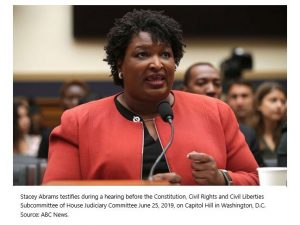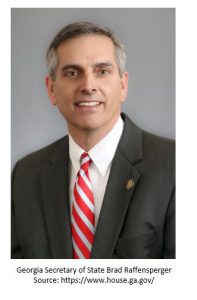On March 25, 2021, Governor Brian Kemp signed SB 202, a 98-page omnibus bill that redefines election laws for the state of Georgia. The result was an immediate lighting of a political powder keg that exploded in equal measure across mainstream and social media outlets, touching off outcries and charges of voter suppression and racism akin to Jim Crow laws linked to our collective dark past as a country. Undaunted, proponents of the law claimed they were not suppressing voters, but protecting the integrity of our system form voter fraud. So, what are the allegations, and how founded are they?
To get to the bottom of this, I took several measures. First, and perhaps most important, I took an objective, neutral approach to understanding the issue. This meant before adopting an opinion, I gathered facts, looking at information from both sides of the issue, and examining the context of the law and its implications on voters’ rights.
Second, I determined what the specific claims were from opponents of the law, specifically regarding the charges leveled by Stacey Yvonne Abrams, a voting rights activist and author who served in the Georgia House of Representatives from 2007 to 2017, and was the Democratic nominee in the 2018 Georgia gubernatorial election. Third, I read the new law carefully to align the actual language of the text to the specific allegations. This step also meant comparing the original law with the changes of SB 202.
The impetus of the law revolves around concerns of voter fraud in Georgia in the 2020 Presidential and congressional elections. Section 2 of the law states:
While each of the changes in this legislation in 2021 stands alone and is severable under Code Section 1-1-3, the changes in total reflect the General Assembly’s considered judgment on the changes required to Georgia’s election system to make it “easy to vote and hard to cheat,” applying the lessons learned from conducting an election in the 2020 pandemic.
It is beyond the scope of this article to chase down the validity of such voter fraud claims. Although most media outlets and former Attorney General William Barr found no evidence of wide-spread corruption, there are many people who believe otherwise, and I will take their intentions as earnest. However, the context of this law is broader than 2020. Context must also include previous attempts to suppress votes through a system of Jim Crow laws and other illegal means.
But context also means understanding how the previous voting laws were amended, and potentially restricted. With that in mind, these are the specific allegations against SB 202:
- It takes power away from local officials and allows the GOP to replace them with partisan hacks of their choosing.
- The law makes it harder to cast a provisional ballot on Election Day if a voter shows up at the wrong precinct.
- It requires that a voter has a photo identification or some other form of identification in order to cast an absentee vote.
- It shortens the federal run-off period.
- It shortens voting time windows and allows counties to limit voting hours.
- It prohibits any personnel from serving food and drink.
- It prohibits officials from sending absentee ballot applications to voters unless the voter specifically requested one.
- It reduces drop box availability.
Voter Suppression Claim # 1: It takes power away from local officials and allows the GOP to replace them with partisan hacks of their choosing.
One of the biggest issues that led to SB 202 is the claim that local official were overwhelmed with potential fraud, such as excess duplicate ballots via ballot harvesting, and that this dynamic was destroying the integrity of the voting system. This prompted the Georgia State Congress to impose broad oversite via the Georgia State Election Board. Here is the text of the law:
In the case of the State Election Board exercising its powers under subsection (f)of Code Section 21-2-33.1, the individual appointed by the State Election Board to exercise the power of election superintendent.”
State Election Board to exercise the power of election superintendent.”
While it’s impossible to prove that the intent of this provision is to empower Republicans to run roughshod over Democrats, there is no doubt the Georgia State Election Board, headed by Secretary of State Brad Raffensperger, a Republican who supported SB 202, would be granted unprecedented powers. The law does spell out the following specifics as safeguards:
The chairperson of the board shall be nonpartisan. At no time during his or he service as chairperson shall the chairperson actively participate in a political party organization or in the campaign of a candidate for public office, nor shall he or she make any campaign contributions to a candidate for public office. Furthermore, to qualify for appointment as chairperson, in the two years immediately preceding his or her appointment, a person shall not have qualified as a partisan candidate for public office, participated in a political party organization or the campaign of a partisan candidate for public office, or made any campaign contributions to a partisan candidate for public office.
However, it’s not unreasonable for people to feel these guidelines could be circumvented. Furthermore, the law provides broad powers to a superintendent, stating:
Such individual shall exercise all the powers and duties of a superintendent as provided by law, including the authority to make all personnel decisions related to any employees of the jurisdiction who assist with carrying.
While there may be need for more oversight to prevent future fraud, having such discretionary power is rife for abuse, and it also goes against years of established protocols that entrust the integrity of our elected officials. Ironically, Republicans recently objected to H.R. 1: For the People Act of 2021, designed to expand voting rights.
There was a legitimate claim that this federalized the voting system, making it susceptible to abuse and fraud. Mitch McConell, Senate Minority Leader, said H.R. 1 shows a “distressing lack of faith in our elections.” Perhaps that is the core of the issue on both sides, necessitating the need for open and frank discussion across the aisles. However, by centralizing control over elections, SB 202 falls short of that laudable goal while setting up an accountability system that is inherently distrustful.
Voter Suppression Claim # 2: The law makes it harder to cast a provisional ballot on election day if a voter shows up at the wrong precinct.
The laws states in Section 2 the concerns regarding provisional ballots:
The sanctity of the precinct was also brought into sharp focus in 2020, with many groups approaching electors while they waited in line. Protecting electors from improper interference, political pressure, or intimidation while waiting in line to vote is of paramount importance to protecting the election system and ensuring elector confidence…
In keeping with that perspective, it adds:
If the person presents himself or herself at a polling place in the county in which he or she is registered to vote, but not at the precinct at which he or she is registered to vote, the poll officials shall inform the person of the polling location for the precinct where such person is registered to vote.
The poll officials shall also inform such person that any votes cast by a provisional ballot in the wrong precinct will not be counted unless it is cast after 5:00 P.M. and before the regular time for the closing of the polls on the day of the primary, election, or runoff and unless the person executes a sworn statement, witnessed by the poll official, stating that he or she is unable to vote at his or her correct polling place prior to the closing of the polls and giving the reason therefor.
On one hand, it seems rational that people should vote in their designated precincts. Doing so makes it easier for election officials to keep track of the electors in their precincts. However, early (advanced) voting in Georgia is open, meaning registered voters can vote in any precinct.
Given that the majority of people now vote in advanced polls, it doesn’t seem logical that suddenly on the official election day, a local precinct becomes suddenly so inviolable. Moreover, if the law requires voters to show some type of official identification, why should there be such concerns over voting in a different precinct? Such stipulations could easily be perceived as voter suppression.
Voter Suppression Claim #3: It requires that a voter has a photo identification or some other form of identification in order to cast an absentee vote.
Perhaps no other aspect of SB 202 has drawn as much ire as the stipulation for voters to supply some form of official identification for absentee voting. Although Georgia law has always had voter identification requirements for in-person voting, SB 202 lays out the reasons for this, again in Section 2:
Ballot duplication for provisional ballots and other purposes places a heavy burden on election officials. The number of duplicated ballots has continued to rise dramatically from 2016 through 2020. Reducing the number of duplicated ballots will significantly reduce the burden on election officials and creating bipartisan panels to conduct duplication will promote elector confidence…
There are legitimate concerns here. According to CBS News, “incomplete or mismatched signatures have often caused ballots to be rejected. In the June 2020 primary, about 3,200 of 1.1 million mail ballots were rejected for signature issues, as reported by CBS News. As a result, the ID requirement could help election officials process ballots more efficiently.” Here is the specific text:
Any person applying for an absentee-by-mail ballot shall make application in writing on the form made available by the Secretary of State. In order to confirm the identity of the voter, such form shall require the elector to provide his or her name, date of birth, address as registered, address where the elector wishes the ballot to be mailed, and the number of his or her Georgia driver’s license or identification card issued pursuant to Article 5 of Chapter 5 of Title 40.
If such elector does not have a Georgia driver’s license or identification card issued pursuant to Article 5 of Chapter 5 of Title 40, the elector shall affirm this fact in the manner prescribed in the application and the elector shall provide a copy of a form of identification listed in subsection (c) of Code Section 21-2-417. The form made available by the Secretary of State shall include a space to affix a photocopy or electronic image of such identification. The Secretary of State shall develop a method to allow secure electronic transmission of such form.
Moreover, people may use any of these documents as an alternative form of ID (actual text from law):
- other valid identification card issued by a branch, department, agency, or entity of the State of Georgia, any other state, or the United States authorized by law to issue personal identification, provided that such identification card contains a photograph of the elector
- a valid United States passport;
- a valid employee identification card containing a photograph of the elector and issued by any branch, department, agency, or entity of the United States government, this state, or any county, municipality, board, authority, or other entity of this state;
- a valid United States military identification card, provided that such identification card contains a photograph of the elector; or
- a valid tribal identification card containing a photograph of the elector.
This begs the question: Why would it be any more onerous to provide a form of identification for absentee ballots than on the day of the actual election, something already required by Georgia law, and according to a recent poll, is supported by a majority of black people?
Voter Suppression Claim # 4: It shortens the federal run-off period.
SB 202 also tackles the perceived issue of “voter burnout” as it relates to run-off elections. The law sets this up again in Section 2:
The lengthy nine-week runoffs in 2020 were exhausting for candidates, donors, and electors. By adding ranked choice voting for military and overseas voters, the run-off period can be shortened to a more manageable period for all involved, easing the burden on election officials and on electors…
Section 27 adds the following details regarding the time frame:
There shall be a period of advance voting that shall commence: On the fourth Monday immediately prior to each primary or election and as soon as possible prior to a runoff from any general primary or election but no later than the second Monday immediately prior to such runoff.
Beyond the fuzzy language of “as soon as possible,” one has to use the context of the prior law to understand the impact of the revisions of SB 202. Here are the words of the prior law, before being amended:
Unless such date is postponed by a court order, such runoff shall be held… on the Tuesday of the ninth week following such general primary.
The amended law reads:
Unless such date is postponed by a court order, such runoff shall be held on the twenty-eighth day after the day of holding the preceding general or special primary or general or special election.
It’s clear that the time has been cut from nine to four weeks, so it’s valid to assert that this impinges on the ease of electors casting their ballots. And it is also important to point out that a higher percentage of black people work multiple jobs than their white counterparts. So, it is not a stretch to say that shortening the time span for casting votes in a runoff is more burdensome to people of color.
However, it should be noted that this multiple-jobs percentage is only slightly higher than white people. Therefore, another logical conclusion is that this law is in general more burdensome on the working class and poor, which smacks of classism, something that should be addressed.
Voter Suppression Claim # 5: It shortens voting time windows and allow counties to limit voting hours.
Critics of SB 202 also point out that the law limits voting hours. The law states:
Poll hours at a precinct may be extended only by order of a judge of the superior court of the county in which the precinct is located upon good cause shown by clear and convincing evidence that persons were unable to vote at that precinct during a specific period or periods of time. Poll hours shall not be extended longer than the total amount of time during which persons were unable to vote at such precinct. Any order extending poll hours at a precinct beyond 9:00 P.M. shall be by written order with specific findings of fact supporting such extension.
Again, we have language issues. Phrases like “clear and convincing evidence” and “specific findings of fact supporting such extension” seems not only arbitrary, but a potentially impossible semantic litmus test to pass. Secondly, making any appeals subject to rulings of a superior judge seem onerous, putting people’s voting rights in peril. And then there is the lack of logic of it all and it begs the question: Why does impartiality and integrity suddenly cease at 9 o’clock at night?
Voter Suppression Claim # 6: It prohibits any personnel from serving food and drink.
Perhaps no other segment of the law strikes people as cruel as the restrictions around food and water. Here is what SB 202 states:
No person shall solicit votes in any manner or by any means or method, nor shall any person distribute or display any campaign material, nor shall any person give, offer to give, or participate in the giving of any money or gifts, including, but not limited to, food and drink, to an elector…
While it makes sense to limit activities associated with a form of bribery, this seems overly restrictive. And although the law does allow “self-service water from an unattended receptacle of water” to electors, that seems inconvenient given that people are waiting in line and do not wish to lose their places. Whether this component is racist is debatable; whether it is petty is not.
Voter Suppression Claim # 7: It prohibits officials from sending absentee ballot applications to voters unless the voter specifically requested one.
One of the major problems Georgia, as well as other states, face is having third parties mail out ballot applications. This is because people are often unsure if their ballot was processed, leading them to send in duplicate applications. This in turn causes confusion among poll workers who are trying to verify these ballots to ensure voting integrity. “It can be frustrating to election administrators who are getting second, third and fourth absentee ballot applications from people who are sending it in with goodwill” said Minnesota Secretary of State Steve Simon to ABC News.
Section 25 of SB 202 attempts to deal with this issue by delineating the parameters to acquire an absentee-by-mail ballot. The bill stipulates:
Any person applying for an absentee-by-mail ballot shall make application in writing on the form made available by the Secretary of State. In order to confirm the identity of the voter, such form shall require the elector to provide his or her name, date of birth, address as registered, address where the elector wishes the ballot to be mailed, and the number of his or her Georgia driver’s license or identification card issued pursuant to Article 5 of Chapter 5 of Title 40.
If such elector does not have a Georgia driver’s license or identification card issued pursuant to Article 5 of Chapter 5 of Title 40, the elector shall affirm this fact in the manner prescribed in the application and the elector shall provide a copy of a form of identification listed in subsection (c) of Code Section 21-2-417.
The law also allows a relative to apply for an absentee-by-mail ballot, thereby giving some protections to vulnerable voters. However, critics have pointed out that voters are allowed to request an absentee ballot a maximum of 78 days before the election. This is down from 180 days in the previous law, which may allow for better controls, but also, by definition, decreases access to voting.
While it is not a difficult process for individuals to request these ballots, Tom Lopach, president of the Voter Participation Center and Center for Voter Information, has stated to the Huffington Post that the law “makes it virtually impossible to run vote-by-mail [third-party] application programs that help Georgians cast their ballots.” This aspect of the law may not be voter suppression, but it certainly does nothing to help people vote.
Voter Suppression Claim # 8: It reduces drop box availability.
In response to the health threats imposed by the Covid-19 pandemic, Georgia facilitated voter access to the polls by allowing drop boxes where voters could place their ballots. However, allegations of potential voter fraud in the 2020 election made some Georgia legislators nervous, prompting restrictions around drop boxes: Here is what SB 202 says regarding drop boxes:
A board of registrars or absentee ballot clerk may establish additional drop boxes, subject to the limitations of this Code section, but may only establish additional drop boxes totaling the lesser of either one drop box for every 100,000 active registered voters in the county or the number of advance voting locations in the county.
Critics say this formula decreases drop box access and is a form of voter suppression. A report by The Associated Press bolsters this argument, stating: “Just eight boxes will be spread across Fulton County’s nearly 529 square miles — or about one for every 100,000 registered voters. That’s down from the 38 drop boxes that were available to voters last fall.” Nearly half the residents in Fulton County are African American, so depending on how the drop boxes are distributed, high-density neighborhoods of color could be disproportionately burdened.
Yet, drop boxes are not a new thing. According to U.S. News and World Report, “Drop boxes have been used for years in states such as Colorado, Oregon and Washington, where ballots are mailed to all registered voters ahead of every election.” Moreover, given that there are no verifiable reports of wide-spread fraud associated with drop boxes to date, this segment of SB 202 seems punitive at best, and a flagrant attempt to create barriers to voter turnout at worst.
Laws like SB 202 may have good intentions based on valid concerns, but because of certain overly restrictive elements, they are likely to do more harm than good in the long run, creating animosity and distrust among the public. However, labeling them as Jim Crow 2.0 seems not only hyperbolic, but potentially dangerous. Rep. Burgess Owens, a black freshman Republican from Utah who grew up under Jim Crow crows in Florida, takes umbrage with such language and assertions. Mr. Owens stated, “As someone who has actually experienced Jim Crow laws, I’d like to set the record straight on the myths regarding the recently passed Georgia state law, and why any comparison between this law and Jim Crow is absolutely outrageous.”
And while reasonable claims about the burdens the law places on voters in general, and black voters in particular, we should be careful with the labels we use with one another and the generalizations we make, because powder kegs have a way of blowing up our shared values a well as the racist elements of society. Ultimately, we need to find a way to be more truly bipartisan in manner that expands voting access for everyone, especially historically marginalized groups, while guaranteeing the integrity of the system. Anything short of that is not living up to the potential of our country. It’s nothing less than our collective future at stake.






